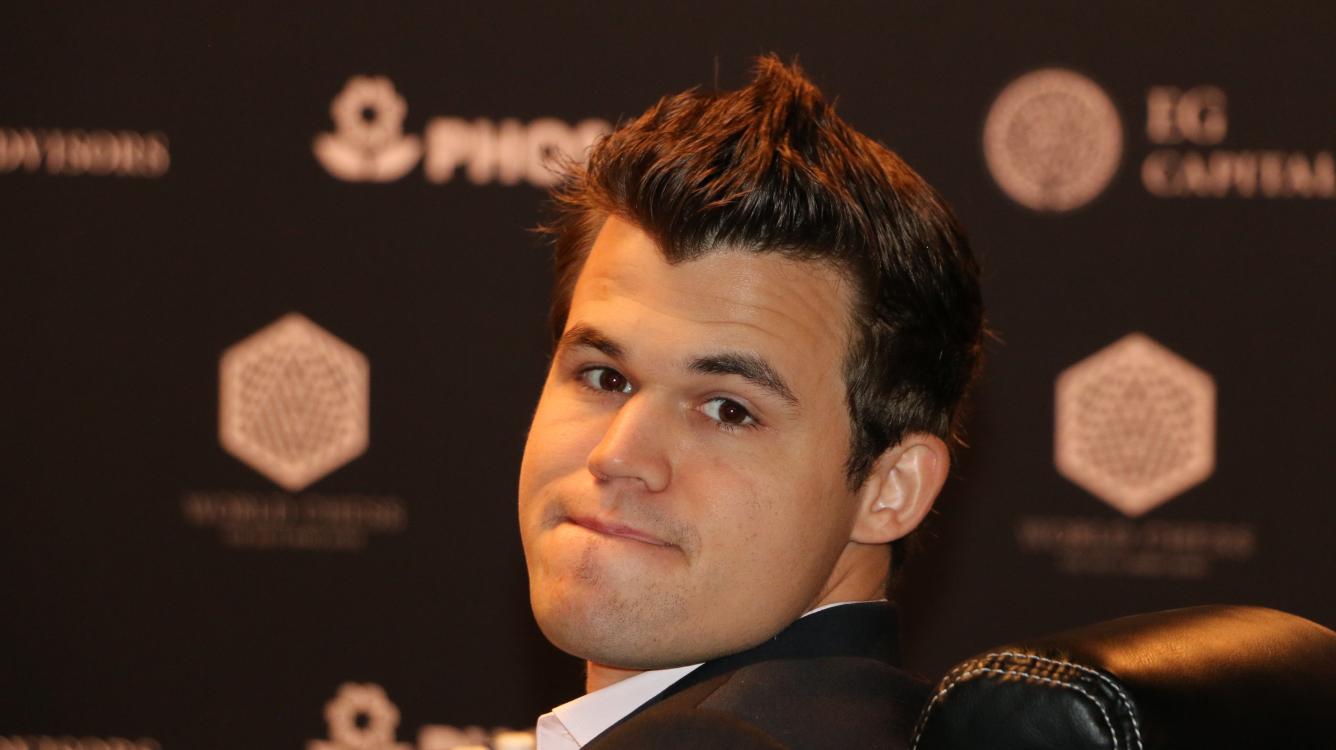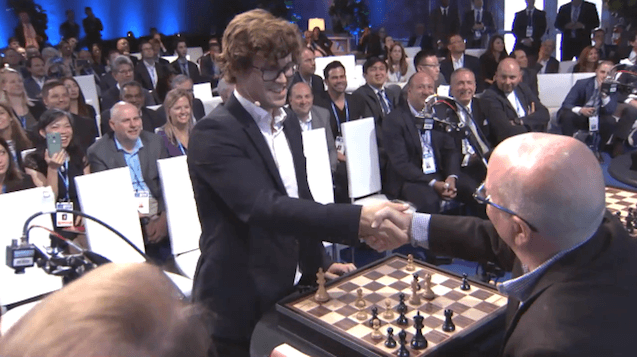
Carlsen At Milken Institute: 'I Don't Presume To Know Much At All'
What does GM Magnus Carlsen have to do with Kareem Abdul-Jabbar? Honestly, not much (there are 3189 blocks and 2832 rating points between them). But such is the nature of the Milken Institute's Global Conference 2017, which took place earlier this week in Los Angeles.
Who gathered to hear them both speak? About 3,500 "senior decision-makers" attended from sports, science, politics, business, and this year, chess. The theme of this edition of the four-day conference, put on by the non-profit think tank of the same name, was to "Build Meaningful Lives."

If a "meaningful life" means losing to Carlsen at least once in chess, several people got their wish at the Milken Institute's Global Conference 2017.
Besides Carlsen and the NBA's all-time leading scorer, other notable speakers included former vice president Joe Biden, former president George W. Bush, four current U.S. cabinet secretaries, the director J.J. Abrams, and the musician Moby, to name only a few.
Chess.com vice president Danny Rensch also attended, for -- what else -- commentary. Chess.com CEO Erik Allebest stopped by, serving as arbiter for Carlsen's 10-board simul.

Yes, Danny Rensch can still commentate while in a suit. However, he wasn't allowed to drink from his gallon water jug while on stage.
Before the actual chess, Carlsen was interviewed in front of the crowd, and some proved to have some chess knowledge. One question from the audience: "How do I get my 10-year-old son to stop playing the Stonewall?"
Here's a sampling of Carlsen's thoughts. Most questions from the moderator focused on his preparation, the sporting nature of chess, and what other talents Carlsen professes. For his part, many of the world champion's answers were prefaced by him demurring and claiming that he hasn't mastered much besides the game, but he does enjoy learning. At one point he said, "I don't presume to know much at all."
- On genius:
"What kind of talent I had when I was really young was that I was able to concentrate on something for a really long time. My interest didn't really wane...That's been my main advantage. I've never been the one to grasp things the quickest, but I never stopped learning as soon as I became interested in a subject."
- On his daily routine:
"I would want to be a role model. As you talk about an athlete who wakes up at seven every day, then you have two training sessions...for me, it's not like that. [Carlsen famously arises on the north side of noon. -- M.K.] I definitely think about chess all the time. I work at chess every day but it's not like I have a routine. It's always been based on inspiration for me. Fortunately, I haven't run out of inspiration yet...Sometimes I play better when I haven't slept that much, because you kind of play more creative."
He added that he tries to sleep at least eight hours and cut down on sugar intake for a "steady level of blood sugar when I play."

We're guessing you didn't hear Carlsen speak in person. Tickets to the event cost from $12,000 to $50,000.
- On other health regimens:
"I did yoga for a while. I haven't really meditated much. In general I like to be active so I do that for fun. It helps my chess. I think I should do more meditation because the few times I've done it I don't know if I've shown bad results but it definitely helped my mind be clearer."
- On computers:
Carlsen said he much preferred playing humans. "The problem is that it still feels like you are playing somebody stupid when you are playing the computer. Losing to somebody you know doesn't understand the game as well as you, that's an unpleasant feeling."
- On how he deals with defeat:
"Not very well. I try to win the next one. I've always been told that you should win and lose with a smile, but since I became a professional, I've thought the best way of learning to deal with defeat is not to lose."
- On life after chess:
"I'm still motivated. I'm still learning. As long as I will do that I'll keep playing. Who knows how long it will last?"

- If aliens invaded and he had one game to save all of humanity and he was White:
"In such case I would probably play an opening like 1. Nf3 or the English. I wouldn't want to stake it on a theory battle. I'd probably want to keep a lot of pieces on the board and try to outsmart him eventually. Besides, if I make a couple of quiet moves at the start, I will probably be able to tell if the aliens are any good at chess or not."
- On his favorite opponents:
"There's a U.S. player, Fabiano Caruana. He's very interesting to play. First of all, because he's so strong. But also, there's no bullshit in his play. He doesn't care if he's playing me or any[one]. He goes about with his strategy and always poses me a great challenge. There are others like the Armenian player [Levon] Aronian, and the Indian [Viswanathan] Anand."
Here's the full video. If you don't care for the Q&A, you can skip to 33:30 when Rensch is introduced and the simul begins.
The actual chess was no easy feat: 10 games played at 10 minuters per game, with no increment. Carlsen had everything under control, except he forgot one fairly large thing. An entire game!
With all but one of the games finished on one side of the linear setup, Carlsen saw his undeveloped queenside and complete lack of pieces off the second rank. He mistakenly thought that the board had been set up after the game concluded.
But no, he had simply not brought pieces out on the left side of the board. Consequently, he just failed to make any more moves there and lost his only game on time.
Rensch gave him a chance for redemption afterward, asking Carlsen to finish off the game anyway. First, Rensch had Carlsen estimate how many moves it would take to mate. Carlsen guessed "six or seven," and indeed, mated in six.
That kind of prognostication likely impressed the crowd as much as him running the table with the other nine games.


